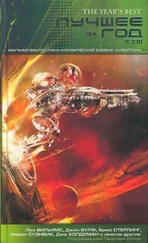“Even the New York mammoths are only 70-percent genuine,” says Renate, “and the Americans are having considerable difficulty in successfully breeding from them for that reason…”
“Something to do with incompatible chromosomes I believe. And most of them have defective kidneys…”
But Victor the quiet Englishman suddenly gives a strangled cry: “For God’s sake ! Can’t you two shut up even for one moment and just look at the things!”
Franz and Renate gape at him in astonishment, along with a whole segment of the crowd. Just as astonished as they are, Victor turns his back and walks away.
He has no idea where he is going, but a little later a thought occurs to him. He takes the battered visiting card out of his pocket and heads for the Kreuzberg apartment of Dr Heinrich Gruber.
* * *
“Come in, my friend, come in!”
It is musty and dark, like a brown cave, full of wood and the smell of pipe smoke, and Victor has the feeling that he is the first visitor for quite some time.
“Come on through!”
The old man’s eyebrows bristle with pleasure and animation as he ushers Victor into his small sitting room and dives off into a grubby little kitchen to fetch beer. Victor looks around, feeling uncomfortable and embarrassed and wondering why he came.
The sitting room clearly doubles as Gruber’s study. Half the floor-space is covered in books, journals and papers. On the desk under the window is roughly piled up a long print-out, covered with an unreadable gobbledegook of letters, numbers and punctuation marks.
…XXQpeNU’B VFF6VV G’NNLPP P*JJVNKL’L JGDSF’E^X MX9*M MMLXV XVOG? KK’B KQQZ…
“This is Cassiopeian?” Victor asks as Gruber returns with the beer.
“ Ja, ja, that is the standard notation of Cassiopeian.”
The elderly man rummages through a stack of manila files on a small side table. “You probably remember that the message contains a repetitive element? Every 422 days it repeats the same five-day-long passage known as the Lexicon, which turns out to be a ‘Teach Yourself’ guide to the language. The key to understanding it was when we discovered that part of the Lexicon consisted of co-ordinates for a spatial grid. When these were mapped out, they produced pictures. The Cassiopeians taught us the basics of their language by sending us pictures and accompanying each picture with the appropriate word or words…”
He goes to a computer and taps on keys.
Suddenly a face stares out at Victor, thin and long, utterly inscrutable, crowned with spiky horns…
“This one is a female,” says Gruber, tapping another key. “This is a male. This belongs to the third sex, which I call promale. If you remember, the Cassiopeians have a triploid reproductive system, a simple biological fact which permeates the whole of their language, their culture, their metaphysics. They simply do not see the world in terms of black and white, yes or no, positive or negative. Everything is in mutually exclusive threes…”
He taps more keys and new images roll across the screen: plants and strange animals, buildings strung like spiders’ webs between enormous diagonal struts…
“They are incredible pictures,” says Victor. “I’ve seen them before of course, when they were in all the papers, but you’re quite right, it’s amazing how quickly we’ve all just forgotten them.”
Gruber smiles. “The images are fascinating of course, but they are really only the key to the text…”
Victor smiles. “Which is truly nothing but philosophy?”
He is dimly aware that this is where the controversy lies: the extent to which the text has really been translated or just guessed at.
After all, who would think of beaming out philosophy to the stars?
Gruber nods. “Even though they have made a powerful radio transmitter, the Cassiopeians are not especially sophisticated technologically. They simply don’t put such a high store by science and technology as we do: they consider all that to be only one of three distinct and separate fields of knowledge.”
Victor asks what the other two are but Gruber is too preoccupied with his own train of thought to answer.
“The point about the Cassiopeians is that they are not afraid to think ,” says Gruber, standing up. “They still trust themselves to do something more imaginative than count! As a result their ideas are beautiful and they know it, so they beam them out for anyone who wants to listen.”
He laughs angrily. “Which on this planet at least, sometimes seems to amount to about eight people among all the seven billion inhabitants!”
He perches on a table, takes out his pipe and begins to fill it. Victor seems to remember that there had been some suggestion too that the pictures had been greatly enhanced: crude matrices of dots had been ‘interpreted’ to a point that was arguably simply wishful invention. Perhaps even deliberately doctored?
Gruber stands up again agitatedly, thrusting the still unlit pipe at the young Englishman.
“My dear friend, what the Cassiopeians offer us is something that we desperately need: wisdom ! Our own ideas have grown stale. We are in a blind alley. Christianity was once a brilliant new liberating leap. So once was scientific rationalism. But they have grown old. We have no real ideas any more, not even us Germans, for whom ideas and philosophy were once almost a vice. Especially not us Germans. Human philosophy no longer dares to attempt the big picture. All we have is the pursuit of cleverer and cleverer technologies, all of them quite pointless of course in the absence of any system of values that could tell us what all this cleverness is for .”
He laughs self-deprecatingly and sits down again, wiping a speck of spittle from his lower lip. “But as you can see this is something of an obsession with me. Have some more beer. It comes from my homeland of Swabia. Not bad, do you agree?”
Victor smiles. The beer is indeed good, and very strong. He feels quite at ease. He finds himself liking the odd old man.
Gruber picks up a file and begins to read aloud: “Just as there are three sexes, three states of matter and three Modes of Being – Substance, Life and Soul – so there are three principles in the universe constantly at war: Gentleness, Valour and Evil. There can be no reconciliation between these three, no final resolution of their perpetual conflict, only temporary alliances. Those who hate Evil must surely hope for an alliance of Gentleness and Valour, full of contradictions though such an Alliance will inevitably be. But oftentimes in history it is Valour and Evil that come together against Gentleness and we see cruel, harsh and warlike nations, preoccupied with honour, indifferent to suffering.”
He flips over the page: “At other times it is Gentleness and Evil that form an alliance against Valour. Nations become timid. They fear passion. They try to hide themselves away from encounters with suffering and death…”
“That sounds a bit like Europa!” observes Victor, and the old scholar beams at him delightedly.
“ Precisely , my friend, precisely. We are obsessed with the fruitless struggle to eliminate disease and accident and death. We cordon off all that is distressing and unruly in the Underclass Estates. We have our wars in faraway countries, and watch them from the comfort and safety of our living rooms. We confine adventure to the Virtual Reality arcades, where no one ever gets hurt but nothing is ever achieved. We do not trouble one another any more with our untidy sexual passions, but release them (if we must) in the hygienic liebespielen , or in the new synthetik brothels, which everyone says are so ‘civilized,’ because they do not spread disease and do not exploit the vulnerable…”
Читать дальше











